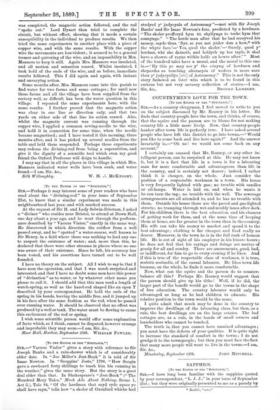COUNTRYMEN'S LOVE FOR THE TOWN.
[To THE EDITOR Or THE "SPECTATOR."] SIR,—As a country clergyman, I feel moved to write to you on the subject discussed by Mr. Reaney in his letter. He finds that country-people love the town, and thinks, of course, that the squire and the parson are to blame for not making country life a little more lively. Now, that country-people hanker after town life is perfectly true. I have asked several people who have left this district to go into towns,—" Would you like to come back and live here again ?" And the answer invariably is,—" Oh no ! we would not come back on any account."
I certainly am amazed that Mr. Reaney, or any other in- telligent person, can be surprised at this. He may not know it, but it is a fact that life in a town is for a labouring man far more comfortable and advantageous than life in the country, and is certainly not dearer ; indeed, I rather
think it is cheaper, on the whole. Just consider the position of a respectable workman in a town. His house is very frequently lighted with gas ; no trouble with candles or oil-lamps. Water is laid on, and when he wants it he can turn the tap ; no trouble with the well. The sewerage arrangements are all attended to, and he has no trouble with them. Outside his house there are the paved and gas-lighted streets ; no tramping through wet and muddy lanes after dark. For his children there is the best education, and his chances of getting work for them, and at the same time of keeping them at home, are far greater in the town than in the country. His wife can take his money to market and spend it to the best advantage ; clothing is far cheaper, and food really no dearer. Moreover, in the town he is in the full rush of human life. He is out of sight of his employer in his leisure hours ; he does not feel that his sayings and doings are matter of gossip for all and sundry. There are amusements, good, bad, or indifferent, for him to go to every evening if he likes. And if this is true of the respectable class of workmen, it is true, mutatis mutandis, of the casual labourer. He likes town life because, on the whole, he finds it more comfortable.
Now, what can the squire and the parson do to counter- balance all this ? Perhaps Mr. Reaney would suggest that the parson should give up his tithe ! Well, if he did, the larger part of the benefit would go to the towns in the shape of free education. The country labourer would only be advantaged as long as he had children to educate. His relative position to the town would be the same.
I quite admit that much may be done in the country to improve the dwellings of the labouring class, but then, as a rule, the best dwellings are on the large estates. The bad cottages are, as a rule, in the hands of small owners and leaseholders who cannot be touohed.
The truth is, that you cannot have unmixed advantages ;
you must have the defects of your qualities. It is quite right to increase the standard of comfort in the towns; I do not grudge it to the townspeople ; but then you must face the fact that many more people will want to live in the towns.—I am, Sir, &c.,






































 Previous page
Previous page